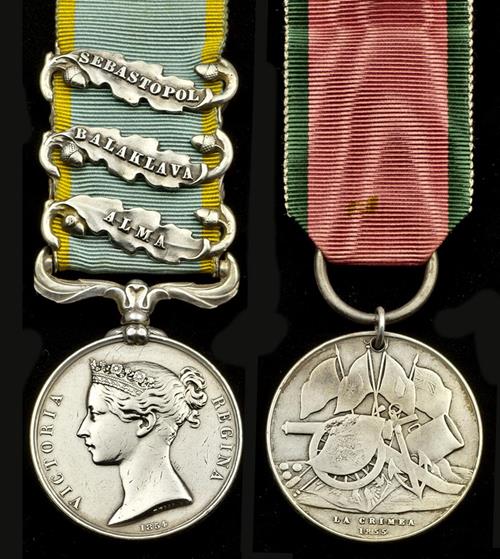
Auction: 16001 - Orders, Decorations, Campaign Medals and Militaria
Lot: 171
An Interesting Crimea Pair to Private J. Bagshaw, 4th Light Dragoons, Who Charged With the Light Brigade and Was Taken Prisoner By the Russians, 25.10.1854; He Subsequently Provided an Affidavit in the "Cardigan vs Calthorpe" Libel Suit
Crimea 1854-56, three clasps, Alma, Balaklava, Sebastopol (J. Bagshaw. 4th Lt. Dragns.), officially impressed, pawn broker's marks in obverse field; Turkish Crimea, Sardinian die (Pt. J. Bagshaw. 4th Lt. Dns.), contemporarily engraved in upright serif capitals, pierced for ring suspension as issued, contact marks overall, generally very fine (2)
1581 Private James Bagshaw (1835-72) was born in Ardingly, Sussex. He was employed as a Labourer prior to his enlistment with the 4th Light Dragoons in Brighton. Bagshaw served with the regiment during the Crimean War, and rode in the Charge of the Light Brigade at Balaklava, 25.10.1854. He was taken prisoner by the Russians, and repatriated in Autumn 1855, having been conveyed from Odessa by the steam ship Columbo. Whilst still serving with the regiment in Newbridge, Ireland, Bagshaw became involved with the "Cardigan vs Calthorpe" libel suit.
Earl Cardigan filed for libel against Colonel Calthorpe, for an imputation of cowardice on behalf of the Earl when leading the Charge of the Light Brigade at Balaklava. Cardigan believed that Calthorpe insinuated this in his book Letters from a Staff Officer in the Crimea. The book was first published in December, 1856, and in it, the author, when describing the charge, observed that Lord Cardigan was not present when most needed, owing to his horse taking fright, swerving and galloping to the rear. Lord Cardigan being indignant at this account, applied immediately to the commander-in-chief for a court martial upon Colonel Calthorpe, which was refused. The Earl next asked the Earl of Carlisle, Lord Lieutenant of Ireland, to dismiss Colonel Calthorpe from his staff, which was also refused. On 5th February, 1857, on the publication of a second edition, Earl Cardigan made a speech in the House of Lords, and called on the government to bring the author to a court martial, which was declined. The second edition altered the objectionable passage by adding the following note: The author has relied on statements furnished by officers actually engaged in the charge, but as the excellence of Lord Cardigan’s horsemanship is unquestionable, the idea that his horse ran away with him is no doubt erroneous. This note was repeated in the third edition, which was published in 1858. During 1859 Colonel Calthorpe on being remonstrated with by a friend of Lord Cardigan, directed about 1,000 copies, being all that remained of the publication, to be suppressed. Owing to a new work on the Crimean war by Kinglake being partly published, which had revived the public interest on the subject, Lord Cardigan made an application for the above rule.
It was as part of the above process that Bagshaw swore his affidavit, 29.5.1863, it being filed on the 2nd June, and stating, 'I have been in the regiment nine years. I remember the Charge of the Light Cavalry Brigade at Balaklava on the 25th October 1854. I was on the right of the right squadron in the rear rank. When within about 40 yards of the guns my horse was killed, and I was taken prisoner by the Russian lancers. A Russian officer then came up and asked me in English "Who was that English officer who rode back on the chestnut horse with white heels?" I said, "I did not know." At that time I was not aware what coloured horse Lord Cardigan rode on that day, but I afterwards heard from several of the other English prisoners taken that his Lordship did ride a chestnut horse with white heels during the charge. I never saw his Lordship after we started."
Bagshaw returned to Ardingly in later life, and was buried in St. Peter's Church, West Balcombe Lane.
Dutton in Forgotten Heroes, The Charge of the Light Brigade gives Bagshaw as a three clasp medal, but 'Not recorded on Sebastopol Roll (AS149)'. The medal appears entirely as issued.
Subject to 20% VAT on Buyer’s Premium. For more information please view Terms and Conditions for Buyers.
Sold for
£9,000




